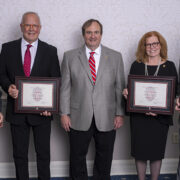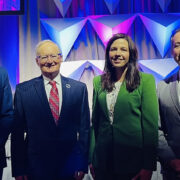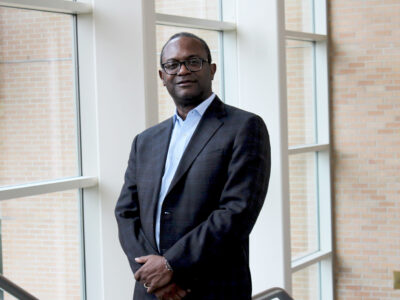
11
December

Alumni Julie Dagam, Tom Thielke, and Philip Schneider are honored for their exceptional contributions to health-system pharmacy
By Katie Ginder-Vogel
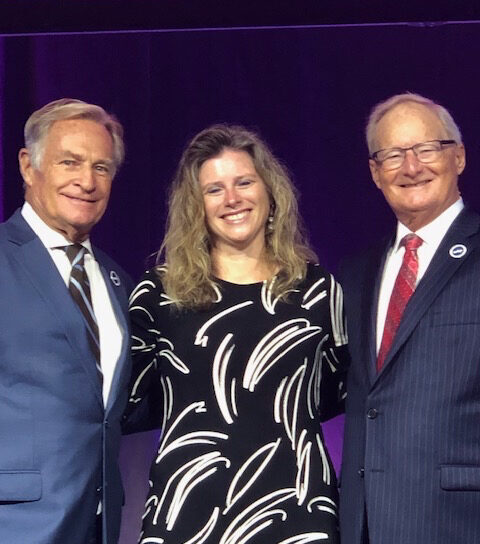
Badger pharmacists are honored with three of the four Board of Directors Awards from the American Society of Health-System Pharmacists (ASHP) in 2023, underscoring the University of Wisconsin–Madison School of Pharmacy alumni’s tremendous impact on the profession.
The ASHP Award of Excellence, recognizing contributions to excellence in pharmacy practice in acute and ambulatory care settings, this year goes to Julie Dagam (BS ’98, PharmD ’99), pharmacy residency program manager for Advocate Health in Milwaukee. Tom Thielke (BS ‘67, MS ‘69), former director of pharmacy at UW Health and emeritus professor at the School of Pharmacy, and Philip Schneider (BS ’70), professor at The Ohio State University College of Pharmacy, earned ASHP Honorary Memberships, in recognition of their extraordinary contributions to pharmacy practice.
“I think I might still be in shock,” says Dagam. “It is awesome. Accepting this honor with the likes of Phil Schneider and Tom Thielke in a room full of amazing colleagues is what’s so special about Wisconsin pharmacy.”
Julie Dagam (BS ’98, PharmD ’99)
Dagam’s greatest contributions to ASHP are in the realm of pharmacy residencies. She was the 2021 chair of the ASHP Commission on Credentialing, which administers the accreditation of pharmacy residency training programs, and led the development of the revised 2023 ASHP accreditation standard for postgraduate pharmacy residency programs.
“I am being honored for something I am privileged to be able to do,” she says. “Getting to be part of the group that does this work is an award in and of itself.”
In 2021, Dagam became the pharmacy residency program manager for Advocate Health, expanding her responsibility to all of Advocate Health’s more than 25 residency programs at sites across Wisconsin and Illinois. Dagam ensures all residency programs are aligned and identifies synergies and growth opportunities among different programs.
“I like developing new programs and sharing the best practices of longtime programs with other residency sites,” Dagam says. “It was difficult to give up being a residency program director because I didn’t have direct responsibility for specific residents anymore, but now I get to do it on a different level and impact more residents across the system.”
She values having the opportunity to strengthen residency programs that lead to residents who are prepared to improve patient care.
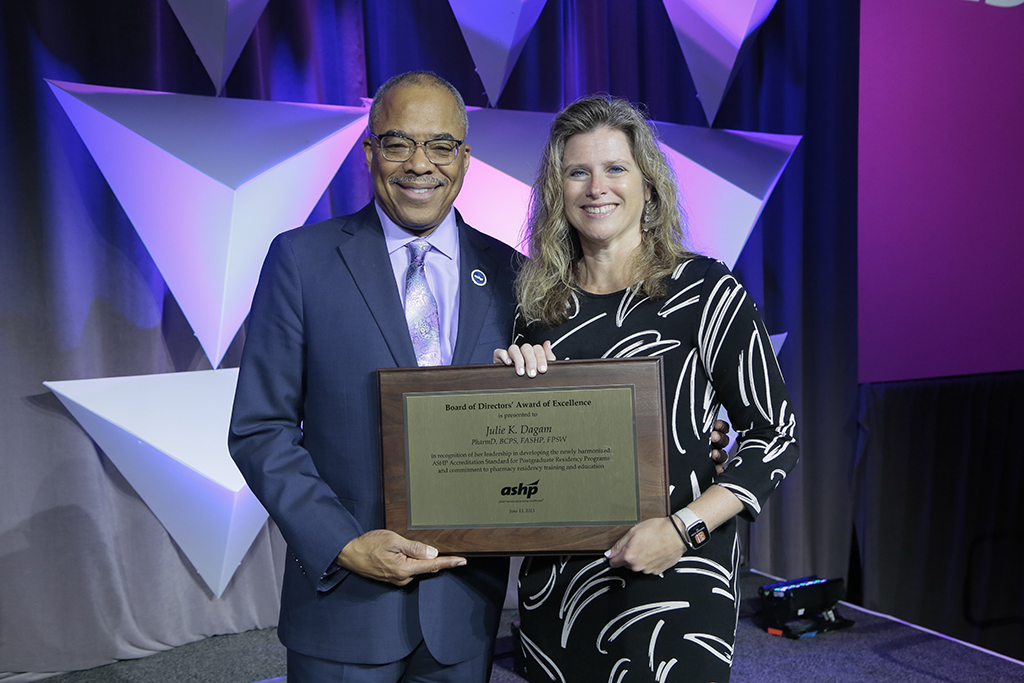
“Ultimately, we’re all here because patients deserve the best care possible, so we need to train our pharmacists to provide the best care possible and put them in positions to provide optimal patient care,” says Dagam. “Residency programs drive the practice forward, keep people learning, and teach best practices for patient care.”
That impact on advancing the profession through the education of early career pharmacists is what motivates Dagam.
“I can’t take credit for all of the things that residents do in their careers, but to have been a tiny part of the beginning of their careers and an influential part of their training is what I’m most proud of,” she says. “Seeing them go on and do amazing things, develop amazing clinical practices, and do great things for themselves, their patients, the pharmacy profession, and professional organizations, is so exciting.”
In addition to her dedication to ASHP, Dagam has been part of the Pharmacy Society of Wisconsin (PSW) since she was a student at the School.
“It’s a good pharmacy home for the state of Wisconsin — one professional society for all of us: students, techs, anyone in the world of pharmacy,” Dagam says. “I feel like PSW has opportunities for anyone, with any level of commitment you want.”
In 2018, Dagam was honored by PSW with an Excellence in Innovation Award to acknowledge her contributions to creating the Wisconsin Pharmacy Residency Conference. Dagam helped establish the planning committee and co-chaired the committee to shape the first conference. When PSW started a fellowship recognition program, Dagam was part of the inaugural class to be recognized.
“It was such an amazing, exciting experience,” she says. “Thinking about pharmacy in Wisconsin — all of the things PSW prepares you to do and the opportunities they have for pharmacists — being named a fellow of PSW was really important to me.”
Dagam credits her professors, mentors, fellow committee members, and colleagues for helping her achieve success in her career.
“I’m the poster child for the importance of mentorship,” she says. “When I went to UW–Madison, having people take an interest in me — when I didn’t know I needed them — to guide me was life-changing,” she says. “Mary Hayney encouraged me to publish a paper in pharmacy school, and I carried that achievement into my residency and early career. I’m really appreciative of that.”
“Ultimately, we’re all here because patients deserve the best care possible, so we need to train our pharmacists to provide the best care possible and put them in positions to provide optimal patient care.”
—Julie Dagam
Dagam says she is fortunate that the mentoring relationships she created, with Professor Mary Hayney and others from various stages of her career, are ongoing.
“If you keep your eyes open, you can find mentors throughout your career,” Dagam says. “They know me incredibly well, and I appreciate that. Getting to know someone as a person, beyond their work tasks, is really meaningful.”
When she reflects upon how her mentors have impacted her, Dagam says it inspires her to mentor others. After all, mentorship benefits both parties.
“People will tell me they appreciate my mentorship, as I appreciate others’ mentorship of me, and it makes me realize mentors and mentees both get so much out of the relationship,” Dagam says. “It is life- and career-changing to work with people who are invested in the work you’re doing and in you as a person.”
Philip Schneider (BS ’70)
Philip Schneider describes his honorary ASHP membership as an “unexpected and great honor.”
“It’s always nice to be recognized by your peers when you’ve worked hard most of your life,” he says. “I’m flattered, and I looked at the list of past recipients, which goes back to the 1950s, and only a couple of people per year have the opportunity to be recognized this way.”
For the past 30 years, Schneider has been part of the team that conducts the national ASHP hospital pharmacy survey every year, which they present at the annual ASHP meeting and publish in the American Journal of Health-System Pharmacy. Schneider also serves on ASHP’s International Commission on Accreditation, which accredits residency programs outside the U.S., and participates in ASHP’s Visiting Leaders program, in which past ASHP leaders visit residency program sites around the U.S. to talk about pharmacy leadership and contemporary issues.

Schneider and his co-honoree, Thielke, were presidents of ASHP one after the other, Schneider from 1988 to 1989. They also collaborated in their work with the International Pharmaceutical Federation (FIP); Schneider wrapped up 30 years of service to the organization in 2020. Both received the Donald E. Francke Medal from ASHP in 2006 for their international contributions to pharmacy.
“That reflects the level of camaraderie we’ve enjoyed,” Schneider says. “When Tom was running the UW–Madison School of Pharmacy and UW Hospital master’s and residency program, and I was running The Ohio State University master’s and residency program, we were friendly competitors, and we’d still room together at the ASHP meetings.”
Schneider was a professor at The Ohio State University College of Pharmacy for 33 years, where he earned his MS degree and later was the founding director the college’s Latiolais Leadership Program. He also established a clinical practice in nutrition support at the Ohio State University and developed a home healthcare practice that he ran for 12 years. In directing the College of Pharmacy combined master’s degree/residency program in health-system pharmacy administration and leadership, Schneider worked with graduate students and residents to publish many of their projects, in addition to his own research.
“I credit my colleagues, residents, and grad students with doing good, hard work that resulted in several hundred publications,” Schneider says. He has also edited four editions of a textbook, Compounding Sterile Preparations, for ASHP over the past 30 years.
In 2008, he joined the University of Arizona College of Pharmacy as professor and associate dean at the new Phoenix biomedical campus, where he spent 10 years before retiring in 2018, after which he reactivated his faculty appointment at The Ohio State University.
Schneider has received a Lifetime Achievement Award from The Ohio State University and a Citation of Merit from the School of Pharmacy.
“That means a lot to me because I left Ohio State to come to Arizona and start a new program,” Schneider says. “The ASHP recognition reflects my contribution to my professional organization, and my contribution to the academy is reflected by that recognition from my two alma maters.”
In 2020, Schneider received the Joseph A. Oddis service award for sustained service to FIP, named after longtime ASHP CEO Joe Oddis.
“I have pride that I graduated from the UW–Madison School of Pharmacy, which commands a great deal of respect, no matter the field.”
—Philip Schneider
“Dr. Oddis was a mentor for me, and to receive an award in his name was great,” says Schneider. “My wife and I had dinner with him toward the end of his life, and I’m glad I had the opportunity to do that while we still could. I would like everybody to know who Joe Oddis was, why this award exists, and why it’s especially important to me.”
Schneider’s scope of contributions extends beyond the bounds of pharmacy. In a groundbreaking move, he served as the first non-physician president of the American Society of Parenteral and Enteral Nutrition (ASPEN). Today, he is involved in the Alliance for Safe Biologic Medicines, which aims to serve patients’ best interests by allowing pharmacists to substitute biosimilars for reference products without first consulting a physician, and he is working to make policymakers and the public aware of insurance companies’ negative impact on quality of care.
“With the combination of Wisconsin and Ohio, I have had the good fortune of finding places where I could learn and grow and get support and learn,” Schneider says. “I have pride that I graduated from the UW–Madison School of Pharmacy, which commands a great deal of respect, no matter the field. It’s an impressive place, especially within pharmacy.”
Thomas Thielke (BS ’67, MS ’69)
Thomas Thielke, School of Pharmacy emeritus professor, spent his career at UW Hospital and Clinics, in roles including assistant director of pharmacy and central services, associate director of pharmacy and central services, director of pharmacy, and vice president for professional and support services. He also coordinated the joint residency and master’s degree program between the School and UW Health.
He joined ASHP as a pharmacy resident 53 years ago and has continued to be a member, attending every ASHP meeting since then. He got involved in two ASHP councils in the late ‘70s and chaired the pharmacy administration interest group. In the mid-‘80s, he was elected chair of the ASHP House of Delegates for three consecutive years, and he served as ASHP president from 1988 to 1990.
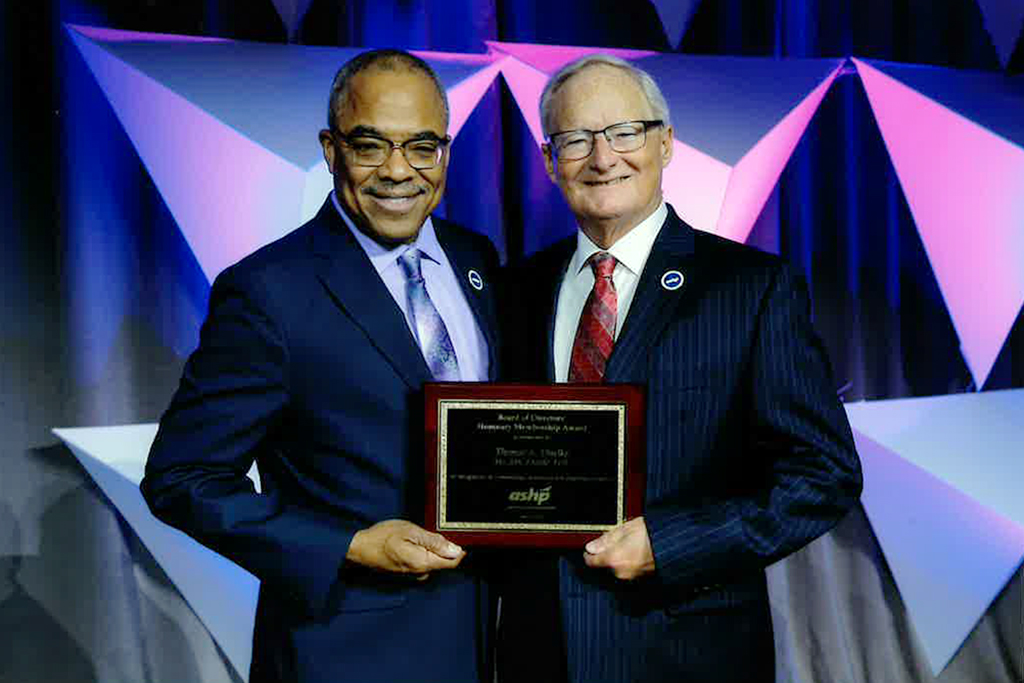
“That was the culmination of all my ASHP activity,” he says. “Since then, I’ve continued to be involved. I was on the ASHP Foundation’s board for a few years, and I serve on committees like the Pharmacy Leadership Group. They continue to call on me. It’s a wonderful organization.”
In addition to his ASHP presidency, he was president of the Wisconsin Society of Health-System Pharmacists (WSHP) and chaired the One Voice-One Vision steering committee that merged WSHP with the Wisconsin Pharmacists Association to create the Pharmacy Society of Wisconsin (PSW), where he served as the first chairman. He is also a member of the American Association of Colleges of Pharmacy, and was previously a member of the American Pharmacists Association and the Academy of Managed Care Pharmacists before his retirement.
Passionate about pharmacy around the world, Thielke has served two terms as vice president, one term as president, and one term as past-president of the Hospital Pharmacists Section of the Federation of International Pharmacists (FIP), of which he was named a fellow in 2010.
He says it feels great to earn an honorary ASHP membership alongside a list of people he’s looked up to for his entire career.
“Some of them are people within ASHP way back in the ‘60s, ‘70s, and ‘80s who occupied presidential offices and were known as some of the really great leaders within the organization,” he says. “Some of them were my own mentors.”
He was named a fellow of ASHP in 1993, earned ASHP’s Harvey A.K. Whitney Lecture Award in 2005, and received the Donald E. Francke Medal from ASHP in 2006. In 2008, Thielke was awarded the John W. Webb Lecture Award by ASHP, which recognizes a hospital or health-system pharmacy practitioner or educator who has distinguished herself or himself through extraordinary dedication to fostering excellence in pharmacy management.
“I’m most proud of the legacy I have with the over 200 pharmacy administration residents I’ve trained.”
—Tom Thielke
But his accolades aren’t limited to ASHP. Thielke was named Hospital Pharmacist of the Year two times — 1978 and 1998 — by the WSHP, which also honored him with the President’s Award; was recognized as Innovative Pharmacy Practitioner of the Year by the Wisconsin Pharmacists Association; and in 2007 received the Distinguished Service Award from PSW. UW Health honored him with the Winston J. Durant Lecture Award, and McKesson celebrated him with the Medication Safety Leadership Award. He’s also been honored by the UW–Madison School of Pharmacy, receiving a 2008 Citation of Merit and the 2009 Alumnus of the Year award.
Although Thielke takes pride in his ASHP awards, he says his greatest achievement is training pharmacy residents. Several of his residents continued on to ASHP leadership, like Stan Kent (MS ’80) and Steve Rough (BS ’91, MS ’94).
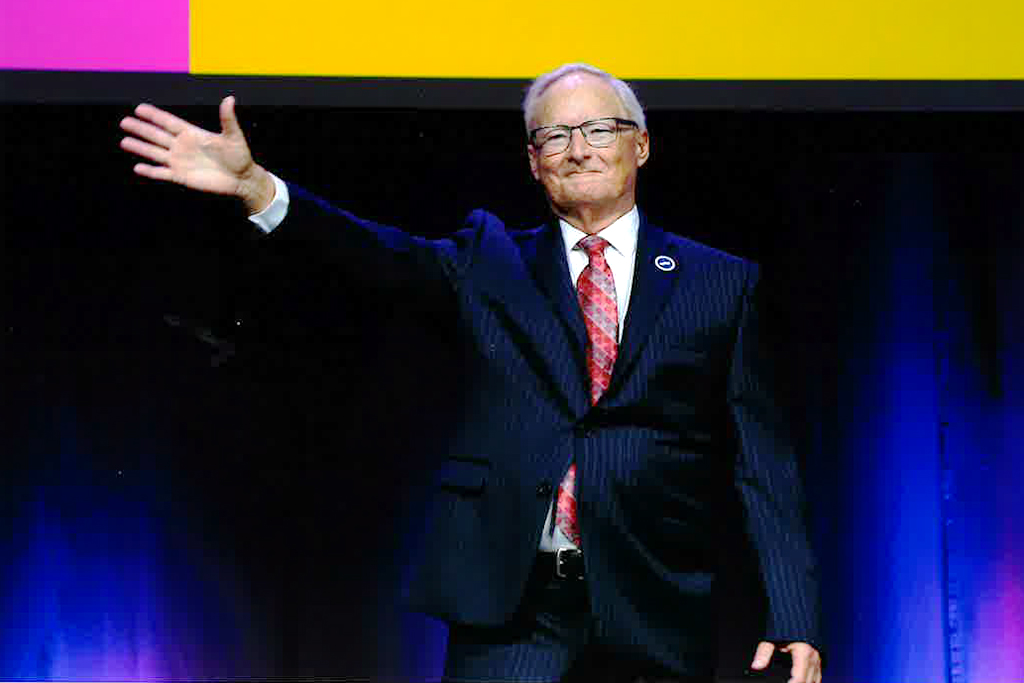
“I’m most proud of the legacy I have with the over 200 pharmacy administration residents I’ve trained,” he says. “We just had our 60th reunion in August, and many came back. The success they’ve attained is what makes me feel so proud. They are in leadership positions all over the country.”
Thielke’s wife jokes that he never retired: In addition to staying involved with ASHP, he is on the advisory board of two companies, ConsortiEX and TrellisRx, as well as the School of Pharmacy’s Board of Visitors. He meets monthly with the School’s Health System Pharmacy Administration residents.
“I’ve been doing that my whole career,” he says. “That’s what keeps me young and the most fun thing I do.”
He continues to give back to the School and its students by funding scholarships, including supporting the Class of 1967 Scholarship and his own, the Tom Thielke Leadership in Action Scholarship.
“My fund provides a scholarship to someone interested in pharmacy leadership,” says Thielke. “I feel very fortunate about what I’ve been able to do and want to give back to the University.”


